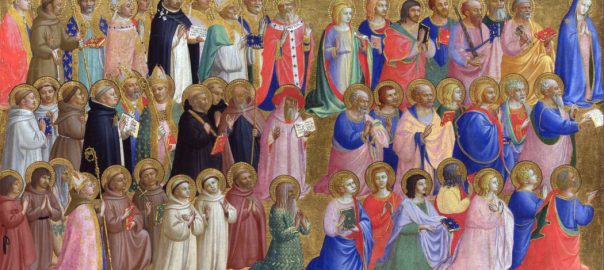What is a Saint?
In the Catholic Church, the saints are ordinary people like you and me who made it to heaven. They’ve done nothing that you and I cannot do, if we persevere in following Jesus Christ and living our lives according to His teaching.
Catholic devotion to the saints is nothing more than respect and admiration for the memory of the deceased heroes of the Church. We honor them as men and women of heroic virtue who can serve as our role models. They were no more perfect than are we; but, at the end of their lives – and hopefully, ours – they received from Our Lord his words, “Well done, good and faithful servant.”
We also ask the saints to intercede for us. Have you ever asked anyone to pray for you when you were having a hard time? That is how Catholics “pray to” the saints – we pray with saints, not to them. As the Letter of James says, “The fervent prayer of a righteous person is very powerful.”
Well-known saints like those below often are remembered in a special way on particular days during the year.
January – February – March – April – May – June
July – August – September – October – November – December
This Weeks Saints
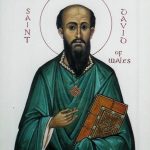
March 1
St. David of Wales
___
Second Sunday of Lent
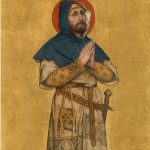
March 2
Blessed Charles the Good
___
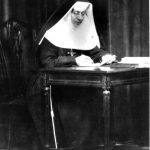
March 3
St. Katharine Drexel
___
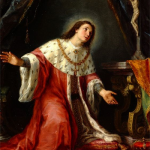
March 4
St. Casimir of Poland
___
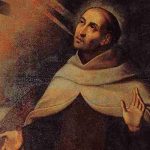
March 5
St. John Joseph of the Cross
___
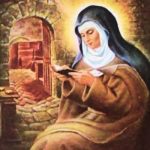
March 6
St. Colette
___
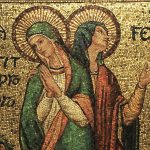
March 7
Sts. Perpetua & Felicity
__
March 3
St. Katherine Drexel
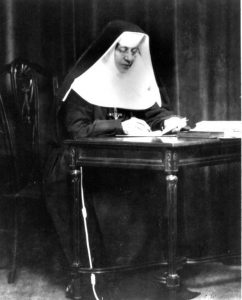
“It is a lesson we all need—to let alone the things that do not concern us. He has other ways for others to follow Him; all do not go by the same path. It is for each of us to learn the path by which He requires us to follow Him, and to follow Him in that path.”
St. Katherine Drexel
Katherine Drexel was born in Philadelphia in 1858, the daughter of a very rich banker and philanthropist. Although she lost her birth mother only weeks after she was born, her father remarried; and Katherine’s step mother was a devout Catholic, devoted to serving the poor. Katherine grew up in a household in which both parents viewed wealth as something to be used to benefit others. When her parents died in 1885, both Katherine and her sisters became heirs to an enormous fortune. Their early upbringing showed forth, however, and they began sharing the income from her family’s estate.
Always interested in the condition of Native Americans, she obtained an audience with with Pope Leo XIII to plead for that charitable cause. The pope challenged her, saying, “Why not, my child, yourself become a missionary?” Returning home, she left on a tour of the American West, and was greatly affected by what she saw. In 1891 she founded a religious order, the Sisters of the Blessed Sacrament, that combined prayer with social action.
During her lifetime she gave away about twenty million dollars, none of which went to her order. Relying on their own devices, her order established 145 Catholic missions and twelve schools for Native Americans, and fifty schools for blacks, Xavier University in New Orleans, Louisiana, the first United States university for blacks. In 1935 she suffered a major heart attack, retired, and spent the next 18 years in a life of prayer and contemplation. She died in 1955 and was canonized 45 years later by Pope St. John Paul II, the first natural-born U.S. citizen saint.
March 7
Sts Perpetua and Felicity
Perpetua and Felicity were Christian martyrs of the 3rd century. Vibia Perpetua was a recently married well-educated noblewoman, said to have been 22 years old at the time of her death, and mother of an infant she was nursing. Felicity, a slave imprisoned with her and pregnant at the time, was martyred with Perpetua.
The two women were persecuted for their Christian beliefs in Roman-owned Carthage. Perpetua documented their tortures, and her writings are the earliest surviving text written by a Christian woman.
When they were tried, Felicity was exempted from the death penalty because she was pregnant. Two days before they were to be put to death, though, she gave birth, allowing her to be martyred with her friends and loved ones.
On the day of their execution, the women were first whipped and then led into an amphitheater, where they were to be torn to pieces by a wild cow. The animal brutalized them, but they were not killed. They were then to be put to death by the blade of a sword. Felicity’s execution went smoothly, but Perpetua’s executioner’s hand slipped and pierced between her bones, failing to kill her. Perpetua then grabbed the man’s hand and guided the sword to her own neck. It was later said that she was so great a woman she could not be slain unless she herself willed it.
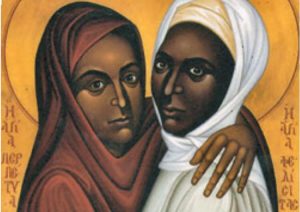
“Stand fast in the faith, and love one another, all of you, and be not offended at my sufferings.”
Last words of Saint Perpetua
